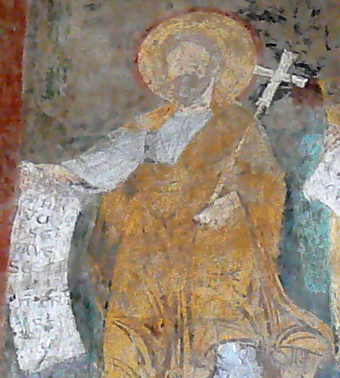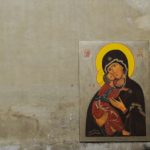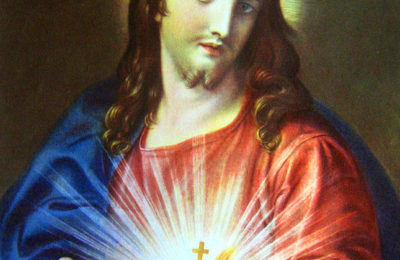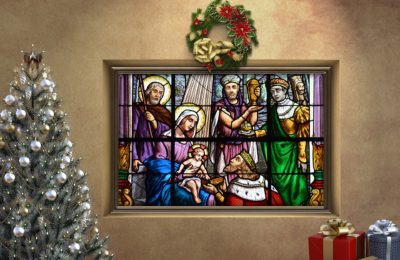Today, the Roman Catholic Church celebrates the feast of the Holy Apostle, and martyr, St. Andrew. St. Andrew is the patron saint of both Scotland and Russia, and is loved throughout the world. His name means manly, and he exhibited the highest form of manliness by his tireless Apostolic work which culminated in his blessed martyrdom, hanging on a sideways cross which has become his symbol: it is called the saltire cross, and is the X shaped cross found on the flag of Scotland.
The following is an excerpt from a reflection on the feast of St. Andrew from the book, The Liturgical Year: Advent, by the Very Reverend Dom Prosper Gueranger, Abbot of Solesmes. Dom Prosper references the liturgical season of Advent in this excerpt, because St. Andrew’s feast often occurs during Advent; or at least, falls just before the start of Advent, as it does this year. Here is the excerpt from Dom Prosper on the feast of St. Andrew:
We open our Proper of Saints for Advent with Saint Andrew, because, although his feast frequently occurs before this holy season has begun, it sometimes happens that we have entered Advent when the memory of this great Apostle has to be celebrated by the Church. This Feast is therefore destined to terminate, with solemnity, the Cycle which is at its close, or to add lustre to the new one which has just begun. It seems, indeed, fitting that the Christian Year should begin and end with the Cross, which has merited for us each of those years which it has pleased the divine goodness to grant us, and which is to appear, on the last day, in the clouds of heaven, as the seal put on Time.
We should remember that Saint Andrew is the Apostle of the Cross. To Peter, Jesus has given firmness of Faith; to John, warmth of Love; the mission of Andrew is to represent the Cross of his divine Master. Now it is by these three, Faith, Love, and the Cross, that the Church renders herself worthy of her Spouse. Everything she has or is, bears this threefold character. Hence it is that after the two Apostles just named, there is none who holds such a prominent place in the universal Liturgy as Saint Andrew.
But let us read the life of this glorious fisherman of the lake of Genesareth, who was afterwards to be the successor of Christ himself, and the companion of Peter, on the tree of the Cross. The Church has compiled it from the ancient Acts of the Martyrdom of the holy Apostle, drawn up by the Priests of the Church of Patrae, which was founded by the Saint. The Churches, too, both East and West, which have inserted these Acts in their respective Offices of Saint Andrew, are of some authority, as is also Saint Bernard, who has made them the groundwork of his three admirable Sermons on Saint Andrew.
About Saint Andrew
Andrew, the Apostle, born at Bethsaida, a town of Galilee, was brother of Peter, and disciple of John the Baptist. Having heard his master say, speaking of Christ: “Behold the Lamb of God!” he followed Jesus, and brought to him his brother also. When, afterwards, he was fishing with his brother in the sea of Galilee, they were both called, before any of the other Apostles, by our Lord, who, passing by, said to them: “Come after me; I will make you to be fishers of men.” Without delay, they left their nets and followed him. After the passion and resurrection, Andrew went to spread the faith of Christ in Scythia in Europe, which was the province assigned to him; then he travelled through Epirus and Thrace, and by his teaching and miracles converted inumerable souls to Christ. Afterwards, having reached Patrae in Achaia, he persuaded many in that city to embrace the truth of the Gospel. Finding that the Proconsul Ægeas resisted the preaching of the Gospel, he most freely upbraided him for that he, who desired to be considered as a judge of men, should be so far deceived by devils as not to acknowledge Christ to be God, the Judge of all.
Then Ægeas being angry, said: “Cease to boast of this Christ, whom such like words as these kept not from being crucified by the Jews.” But finding that Andrew continued boldly preaching that Christ had offered himself to be crucified for the salvation of mankind, he interrupts him by an impious speech, and at length exhorts him to look to his own interest and sacrifice to the gods. Andrew answered him: “I offer up every day to almighty God, who is one and true, not the flesh of oxen, nor the blood of goats, but the spotless Lamb upon the altar; of whose flesh the whole multitude of the faithful eat, and the Lamb that is sacrificed, remains whole and living.” Whereupon Ægeas being exceeding angry, ordered him to be thrust into prison, whence the people would easily have freed Andrew, had he not himself appeased the multitude, begging of them, with most earnest entreaty, that they would not keep him from the long-sought-for crown of martyrdom, to which he was hastening.
Not long after this, he was brought before the tribunal, where he began to extol the mystery of the Cross, and rebuke the judge for his impiety. Ægeas, no longer able to contain himself on hearing these words, ordered him to be hoisted on a cross, and so to die like Christ. Andrew, having been brought to the place of execution, seeing the Cross at some distance, began to cry out: “O good Cross, made beautiful by the body of my Lord! so long desired, so anxiously loved, so unceasingly sought after, and now at last ready for my soul to enjoy! take me from amidst men, and restore me to my Master, that by you He may receive me, who by you redeemed me.” He was therefore fastened to the cross, on which he hung alive two days, preaching without cessation the faith of Christ: after which he passed to Him, whose death he had so coveted. The Priests and Deacons of Achaia, who wrote his Passion, attest that all the things which they have recorded were heard and seen by them…
…the glory of Saint Andrew been blended, in Rome, with that of Saint Peter. But the Apostle of the Cross, whose feast was heretofore kept, in many Churches, with an Octave, has also been chosen as Patron of one of the Kingdoms of the West. Scotland, when she was a Catholic country, had put herself under his protection. May he still exercise his protection over her, and, by his prayers, hasten her return to the true faith!
Let us now, in union with the Church, pray to this holy Apostle, for this is the glorious day of his feast: let us pay him that honour which is due to him, and ask him for the help of which we stand in need.
We have scarce begun our mystic journey of Advent, seeking our divine Saviour Jesus, when lo! God grants us to meet thee, O blessed Andrew, at our very first step. When Jesus, our Messias, began his public life, you hadst already become the obedient disciple of his Precursor, who preached his Coming: you wast among the first of them who received the Son of Mary as the Messias foretold in the Law and the Prophets. But you couldst not keep the heavenly secret from him who was so dear to thee; to Peter, then, you didst bear the Good Tidings, and didst lead him to Jesus.
O blessed Apostle! we also are longing for the Messias, the Saviour of our souls; since you hast found him, lead us also unto him. We place under thy protection this holy period of expectation and preparation, which is to bring us to the day of our Saviour’s Nativity, that divine Mystery in which he will manifest himself to the world. Assist us to render ourselves worthy of seeing him on that great night. The baptism of Penance prepared you for receiving the grace of knowing the Word of life; pray for us that we may become truly penitent and may purify our hearts, during this holy time, and thus be able to behold Him, who has said: Blessed are the clean of heart, for they shall see God.
Thou hast a special power of leading souls to Jesus, O glorious Saint! for even he, who was to be made the Pastor of the whole flock, was presented to the Messias by thee. By calling you to himself on this day, our Lord has given you as the Patron of Christians who, each year, at this season, are seeking that God in whom you art now living: they must begin it with praying to you to show them the way which leads to Jesus.
Thou teachest us this way; it is that of fidelity, of fidelity even to the Cross. In that way you didst courageously walk: and because the Cross leads to Jesus Christ, you didst passionately love the Cross. Pray for us, O holy Apostle! that we may begin to understand this love of the Cross; and that having understood it, we may put it in practice. Thy brother says to us in his Epistle: Christ having suffered in the flesh, be you also armed with the same thought.1 Thy feast, O blessed Andrew! shows us you as the living commentary of this doctrine. Because thy Master was crucified, you would also be crucified. From the high throne to which you hast been raised by the Cross, pray for us, that the Cross may be unto us the expiation of the sins which are upon us, the quenching of the passions which burn within us, and the means of uniting us by love to Him, who, through love alone for us, was nailed to the Cross.
Important, indeed, and precious are these lessons of the Cross; but the Cross, O blessed Apostle, is the perfection and the consummation, and not the first commencement. It is the Infant God, it is the God of the Crib that we must first know and love; it was the Lamb of God that Saint John pointed out to thee; and it is that Lamb whom we so ardently desire to contemplate. The austere and awful time of Jesus’ Passion is not come; we are now in Advent. Fortify us for the day of combat; but the grace we now most need, is compunction and tender love. We put under your patronage this great work of our preparation for the Coming of Jesus into our hearts.
Remember also, O blessed Andrew, the holy Church, of which you wast a pillar, and which you hast beautified by the shedding of your blood: lift up your hands for her to Him, whose battle she is for ever fighting. Pray that the Cross she has to bear in this her pilgrimage, may be lightened; that she may love this Cross, and that it may be the source of her power and her glory. Remember with especial love the holy Roman Church, the Mother and Mistress of all Churches; and by reason of that fervent love she has for thee, obtain for her victory and peace by the Cross. Visit anew, in your Apostolic zeal, the Church of Constantinople, which has forfeited true light and unity, because she would not render homage to Peter, your brother, whom you honouredst as your Chief, out of love to Him who is the common Master of both him and thee. And lastly, pray for Scotland, that has dishonoured thy protection for these three past ages; obtain for her that the days of her rebellion from the faith may be shortened, and, with the rest of our Isle of Saints, soon return to the fold of the One Shepherd.
– from the book The Liturgical Year: Advent, by the Very Reverend Dom Prosper Gueranger, Abbot of Solesmes
That was beautiful. I am especially interested in the portion where Dom Prosper mentions that the liturgical season of Advent calls us to reflect on the Infant Christ, the Lamb of God, vs. the Crucified Christ, which is the primary reflection in the season of Lent. Here is that portion of the text:
Important, indeed, and precious are these lessons of the Cross; but the Cross, O blessed Apostle, is the perfection and the consummation, and not the first commencement. It is the Infant God, it is the God of the Crib that we must first know and love; it was the Lamb of God that Saint John pointed out to thee; and it is that Lamb whom we so ardently desire to contemplate. The austere and awful time of Jesus’ Passion is not come; we are now in Advent. Fortify us for the day of combat; but the grace we now most need, is compunction and tender love. We put under your patronage this great work of our preparation for the Coming of Jesus into our hearts.
Today, the traditional St. Andrew novena begins, which is prayed each day until Christmas. Here is the text of the novena:
Hail, and blessed be the hour and moment at which the Son of God was born of a most pure Virgin at a stable at midnight in Bethlehem in the piercing cold. At that hour vouchsafe, I beseech Thee, to hear my prayers and grant my desires.
(Mention your intentions here)
Through Jesus Christ and His most Blessed Mother.
Amen.
(To be prayed fifteen times each day of the novena)
Happy St. Andrew’s day!
•SCF
•Image: 5th century mosaic of Saint Andrew located at Basilica of St. Paul Outside the Walls, Roma






